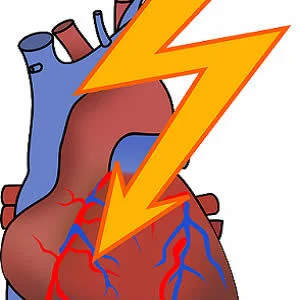New research from University of Sydney shows that the risk of having a heart attack is 17 times higher in the seven days following a respiratory infection. The research is published in Internal Medicine Journal.
See Also: Non-O Blood Groups Have Higher Risk of Heart Attack
This is the first study to find an association between respiratory infections such as pneumonia, influenza and bronchitis and an increased risk of heart attack. Prior studies have suggested that a respiratory infection may act as a trigger for a heart attack, explains senior author Professor Geoffrey Tofler, cardiologist from University of Sydney, Royal North Shore Hospital and Heart Research Australia, but findings from this study show that the risk of heart attack peaks in the first 7 days and then gradually reduces. The risk does remain elevated for one month.
The study included 578 consecutive patients with heart attack due to a coronary artery blockage who provided information regarding recent and usual occurrence of symptoms of respiratory infection. 17% patients had symptoms of respiratory infection within 7 days of the heart attack and 21% within 31 days. Patients were asked if they had experienced flu-like illness with fever and sore throat before their attack. In addition, patients who reported symptoms like common cold, pharyngitis, rhinitis and sinusitis were also analysed.
Lead author Dr Lorcan Ruane points out that risk levels for patients with milder upper respiratory tract infection symptoms were lower risk but still elevated by 13 fold. She also highlights that since upper respiratory infections are quite common even if less severe, it is important to understand their relationship to the risk of heart attacks. People should be advised to take precautions and minimise exposure to infection through flu and pneumonia vaccinations etc.
Professor Tofler added: "Possible reasons for why respiratory infection may trigger a heart attack include an increased tendency towards blood clotting, inflammation and toxins damaging blood vessels, and changes in blood flow. Our message to people is while the absolute risk that any one episode will trigger a heart attack is low, they need to be aware that a respiratory infection could lead to a coronary event. So consider preventative strategies where possible, and don't ignore symptoms that could indicate a heart attack.
Source: Internal Medicine Journal
Image Credit: Pixabay
References:
Ruane, Lorcan et al. (2017) Triggering of acute myocardial infarction by respiratory infection. Internal Medicine Journal; 47 (5): 522 DOI: 10.1111/imj.13377
Latest Articles
heart attack, Respiratory Infections, Risk of Heart Attack
New research from University of Sydney shows that the risk of having a heart attack is 17 times higher in the seven days following a respiratory infection. The research is published in Internal Medicine Journal.










